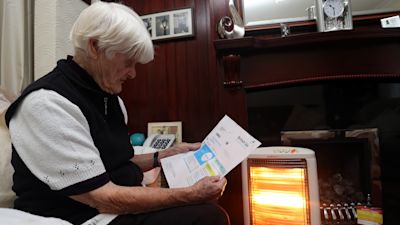Insight
Why we are all going to pay for reckless energy suppliers

ITV News Politics Editor Robert Peston explains how industry troubles may trickle down to consumers
You know that mate of yours who is always boasting they pay way less for energy than you because they’re constantly surfing for the best deal on price comparison websites?
Well they are still going to have the last laugh, even though the energy company that supplied them is going bust. That is because the energy secretary Kwasi Kwarteng promised today that he would protect consumers and keep the official cap on prices, which means that the amount your mate pays for energy will hardly go up at all. And they’ll probably end up paying what you are paying. But as if to rub salt into your wounds, it is you - well all of us - who will end up paying more for our electricity, to keep prices your friend at the cap level, even though for years they benefited from cheap deals offered by businesses that were never run in a sustainable way.
If you think this is unfair and looks like crazy regulation, you may not be alone. But you only have to look at the terms of Centrica’s rescue today of 350,000 People’s Energy customers to see how we are all going to pay for what many will see as reckless gambles by new energy companies. These are young companies that offered cheap energy to customers without fixing the price of the gas they were pledging to sell. So when the wholesale price for gas surged, they faced insolvency.
The most important announcement about all this today was from the owner of British Gas, Centrica, which said it would recover all the costs it is incurring by taking on those 350,000 People’s Energy customers from “the established industry levy in a timely manner”. You what? I’ll tell you what. It means that over the next 15 months every energy customer in the UK will pay more for their energy through higher network charges, that will then be channeled to Centrica.
It means we are all bailing out the People’s Energy’s customers, even though Kwasi Kwarteng takes pride that People’s Energy, as a corporate entity, is not being bailed out. The distinction Kwarteng makes between bailing out customers and bailing out a business is not as significant as he thinks. There is still no moral hazard in the market. Your friend only went for the cheapest deal from a shaky supplier because they thought they could not lose - and they were right.
Here’s the big insult. In the next day or two, Kwarteng, his business department, BEIS, HM Treasury and the industry regulator Ofgem will announce a lifeboat for customers of loads of other failing energy companies.
And the costs of rescuing those customers are likely to run to hundreds of millions of pounds. They could not be recouped from network charges over 15 months without forcing millions of us into penury. So they will probably be recouped from us over five years or so - because the Treasury is likely to create some kind of financial bridging facility for Ofgem.
This means we’ll all be paying for this massive market and regulatory failure over five years. How do you feel about paying more for your energy - through these increased charges - and providing a taxpayer subsidised facility, so that your mate’s energy bills don’t go up as the cost of the failed punt they took by going for the cheapest deals? Fair? Probably not. Whose fault is it? Some would argue it is the government’s, for designing and maintaining a system in which small companies offering cheap prices did not have to prove they were able to withstand market shocks. Here’s the moral - competition is pointless and harmful unless there is a meaningful element of caveat emptor - the principle that buyers have no recourse with the seller if the product doesn't meet their expectations. As we are seeing in the bailout of customers, there is almost none in the energy market. And if this all sounds familiar, it is eerily similar to recent failures in the rail and banking markets. Will politicians never learn?